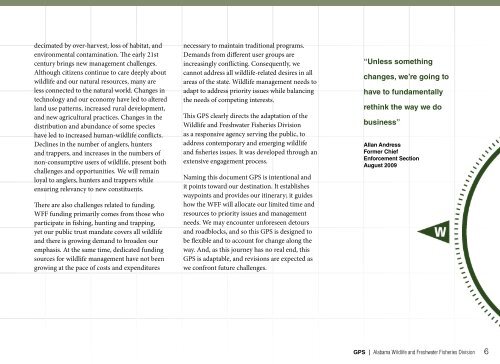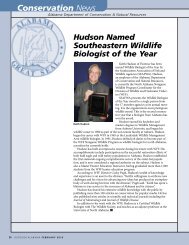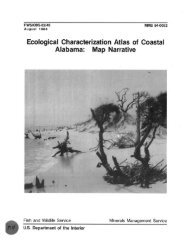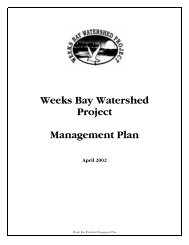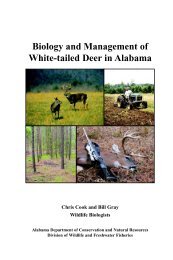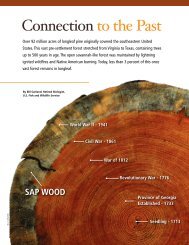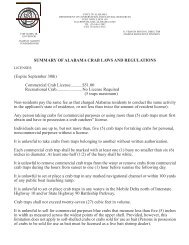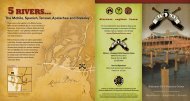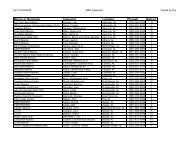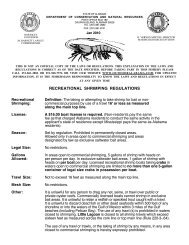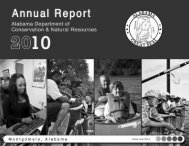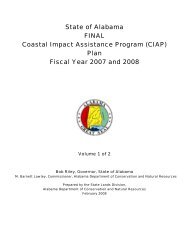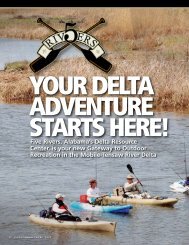WFF's Guiding Principles and Strategies - Alabama Department of ...
WFF's Guiding Principles and Strategies - Alabama Department of ...
WFF's Guiding Principles and Strategies - Alabama Department of ...
Create successful ePaper yourself
Turn your PDF publications into a flip-book with our unique Google optimized e-Paper software.
decimated by over-harvest, loss <strong>of</strong> habitat, <strong>and</strong><br />
environmental contamination. The early 21st<br />
century brings new management challenges.<br />
Although citizens continue to care deeply about<br />
wildlife <strong>and</strong> our natural resources, many are<br />
less connected to the natural world. Changes in<br />
technology <strong>and</strong> our economy have led to altered<br />
l<strong>and</strong> use patterns, increased rural development,<br />
<strong>and</strong> new agricultural practices. Changes in the<br />
distribution <strong>and</strong> abundance <strong>of</strong> some species<br />
have led to increased human-wildlife conflicts.<br />
Declines in the number <strong>of</strong> anglers, hunters<br />
<strong>and</strong> trappers, <strong>and</strong> increases in the numbers <strong>of</strong><br />
non-consumptive users <strong>of</strong> wildlife, present both<br />
challenges <strong>and</strong> opportunities. We will remain<br />
loyal to anglers, hunters <strong>and</strong> trappers while<br />
ensuring relevancy to new constituents.<br />
There are also challenges related to funding.<br />
WFF funding primarily comes from those who<br />
participate in fishing, hunting <strong>and</strong> trapping,<br />
yet our public trust m<strong>and</strong>ate covers all wildlife<br />
<strong>and</strong> there is growing dem<strong>and</strong> to broaden our<br />
emphasis. At the same time, dedicated funding<br />
sources for wildlife management have not been<br />
growing at the pace <strong>of</strong> costs <strong>and</strong> expenditures<br />
necessary to maintain traditional programs.<br />
Dem<strong>and</strong>s from different user groups are<br />
increasingly conflicting. Consequently, we<br />
cannot address all wildlife-related desires in all<br />
areas <strong>of</strong> the state. Wildlife management needs to<br />
adapt to address priority issues while balancing<br />
the needs <strong>of</strong> competing interests.<br />
This GPS clearly directs the adaptation <strong>of</strong> the<br />
Wildlife <strong>and</strong> Freshwater Fisheries Division<br />
as a responsive agency serving the public, to<br />
address contemporary <strong>and</strong> emerging wildlife<br />
<strong>and</strong> fisheries issues. It was developed through an<br />
extensive engagement process.<br />
Naming this document GPS is intentional <strong>and</strong><br />
it points toward our destination. It establishes<br />
waypoints <strong>and</strong> provides our itinerary; it guides<br />
how the WFF will allocate our limited time <strong>and</strong><br />
resources to priority issues <strong>and</strong> management<br />
needs. We may encounter unforeseen detours<br />
<strong>and</strong> roadblocks, <strong>and</strong> so this GPS is designed to<br />
be flexible <strong>and</strong> to account for change along the<br />
way. And, as this journey has no real end, this<br />
GPS is adaptable, <strong>and</strong> revisions are expected as<br />
we confront future challenges.<br />
“Unless something<br />
changes, we’re going to<br />
have to fundamentally<br />
rethink the way we do<br />
business”<br />
Allan Andress<br />
Former Chief<br />
Enforcement Section<br />
August 2009<br />
GPS | <strong>Alabama</strong> Wildlife <strong>and</strong> Freshwater Fisheries Division 6


